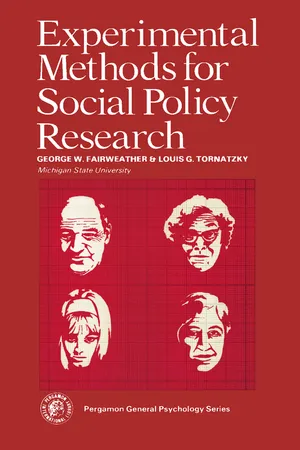
Experimental Methods for Social Policy Research
Pergamon International Library of Science, Technology, Engineering and Social Studies
- 432 pages
- English
- PDF
- Available on iOS & Android
Experimental Methods for Social Policy Research
Pergamon International Library of Science, Technology, Engineering and Social Studies
About This Book
Experimental Methods for Social Policy Research explains how experimental methods can be used in social policy research to help solve contemporary human problems and to preserve and improve the world's physical and social climates. This book argues that scientists can make a major contribution to the solution of social problems by aiding the society in incorporating scientific methods into the social decision-making process. Two principal methods required for solving social problems are highlighted: methods for evaluating social models aimed at solving particular problems, and methods for disseminating those models that are beneficial to the state, the region, and the nation. This book is comprised of 14 chapters and begins with the argument that contemporary social policy decision making is inadequate for the late 20th and 21st centuries. It then defines the basic ingredients for an adequate social policy decision-making apparatus and explains how it can be accomplished. The next chapter outlines the basic parameters of social models and dissemination processes from a conceptual point of view. The remaining chapters describe general experimental procedures from the inception of the ideas to the implementation of social models found to be beneficial. The final chapter is reserved for a discussion of a proposed center for experimental social innovation that would provide research and training. This monograph will be a valuable resource for social scientists and researchers as well as social policymakers, public officials, and citizens who are committed to the improvement of living conditions for all members of society.
Frequently asked questions
Information
Table of contents
- Front Cover
- Experimental Methods For Social Policy Research
- Copyright Page
- Table of Contents
- Preface
- CHAPTER 1. The Basic Ingredients of an Adequate Social Policy
- CHAPTER 2. Integrating Science into Social Policy Decisions: Experimental Social Innovation
- CHAPTER 3. The Parameters of Social Models and Dissemination
- CHAPTER 4. Defining the Social Problem and Planning its Solution
- CHAPTER 5. Forming the Research Team
- CHAPTER 6. Obtaining Administrative Agreements
- CHAPTER 7. Selecting the Research Conditions and Making Them Comparable
- CHAPTER 8. Defining the Population and Obtaining the Sample
- CHAPTER 9. Measuring the Important Parameters
- CHAPTER 10. Administering the Research Program
- CHAPTER 11. Comparing the Experimental Conditions
- CHAPTER 12. Understanding the Social Processes
- CHAPTER 13. Permissible Inferences and Publication
- CHAPTER 14. An Institutional Context for Research and Training: The Centerfor Experimental Social Innovation
- References
- Index
- TITLES IN THE PERGAMON GENERAL PSYCHOLOGY SERIES (Continued)